Business Law Report: Unit 7 - UK Legal System and Business Laws
VerifiedAdded on 2022/11/30
|10
|2538
|486
Report
AI Summary
This report provides a comprehensive overview of UK business law, examining various sources of law, including statutory and common law, and the role of government in the law-making process. It delves into the impact of contract law, employment law, and company law on business operations, illustrating how these areas of law affect businesses. The report also differentiates between legislations, standards, and regulations, offering a clear understanding of their respective roles. Furthermore, it analyzes recent reforms and developments in the English legal system, assessing their effectiveness. The report concludes by emphasizing the importance of business law in ensuring smooth corporate functioning and protecting the rights of both individuals and organizations, which is crucial for business success. The report is structured into tasks, covering key aspects of business law, including sources of law, the law-making process, and the impact of various laws on business operations.
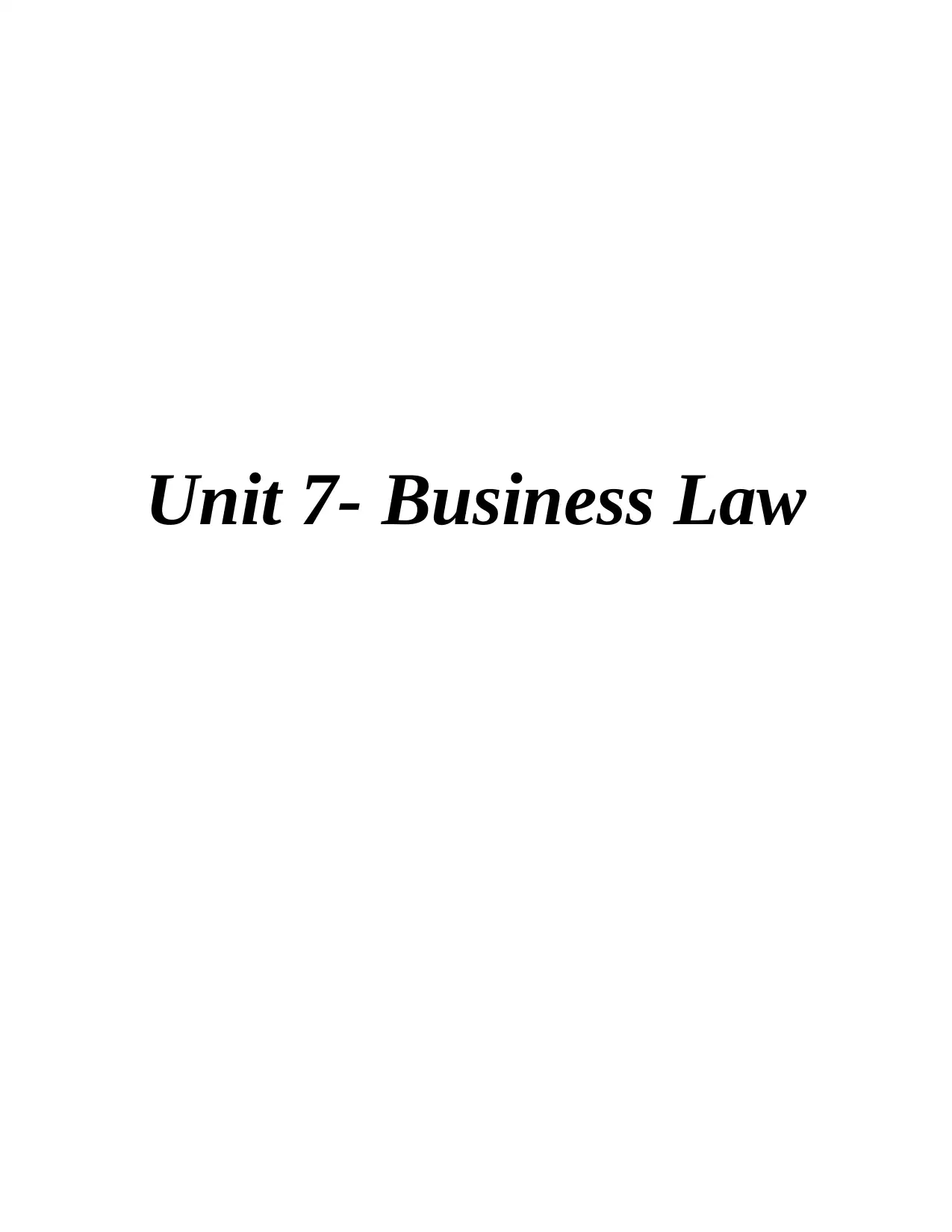
Unit 7- Business Law
Paraphrase This Document
Need a fresh take? Get an instant paraphrase of this document with our AI Paraphraser
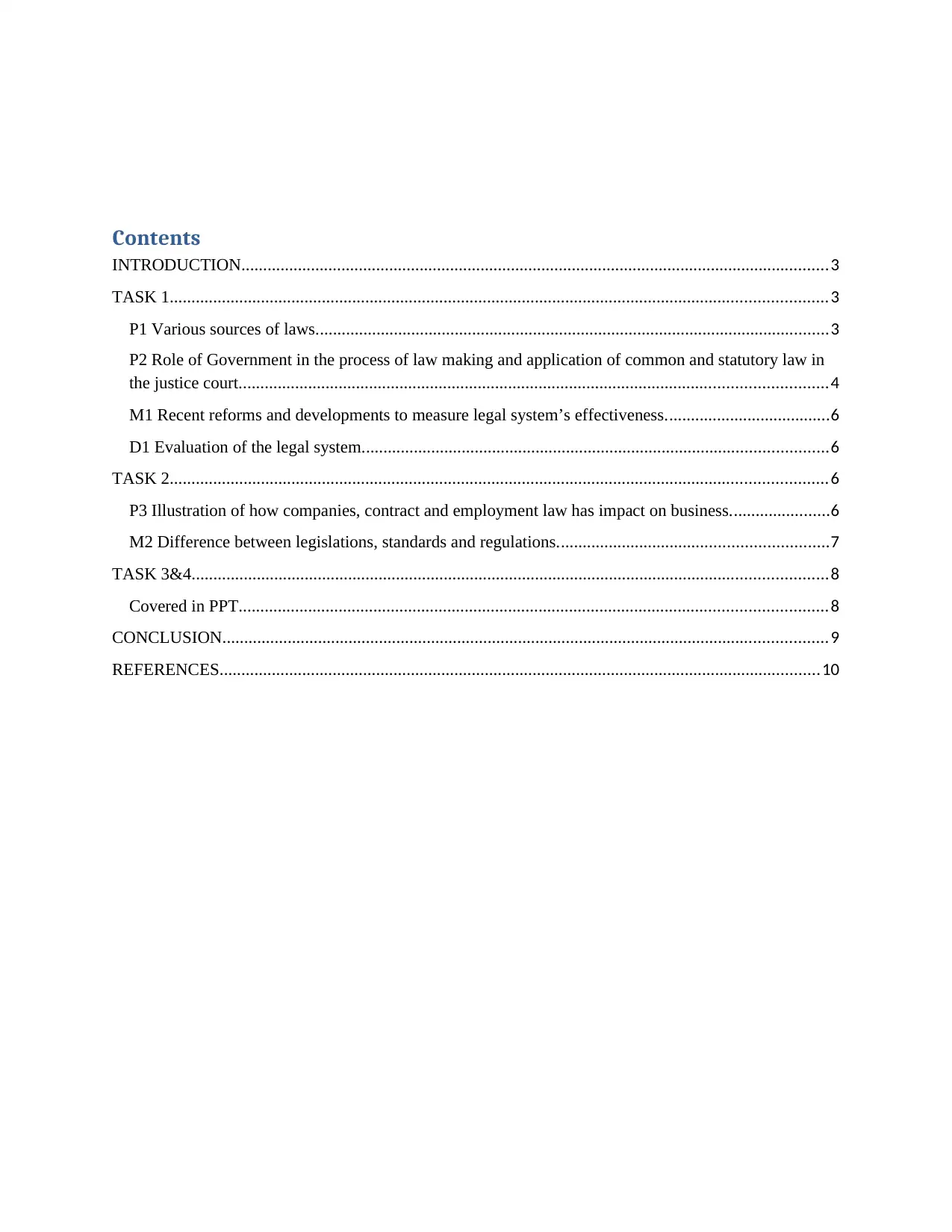
Contents
INTRODUCTION.......................................................................................................................................3
TASK 1.......................................................................................................................................................3
P1 Various sources of laws......................................................................................................................3
P2 Role of Government in the process of law making and application of common and statutory law in
the justice court.......................................................................................................................................4
M1 Recent reforms and developments to measure legal system’s effectiveness......................................6
D1 Evaluation of the legal system...........................................................................................................6
TASK 2.......................................................................................................................................................6
P3 Illustration of how companies, contract and employment law has impact on business.......................6
M2 Difference between legislations, standards and regulations..............................................................7
TASK 3&4..................................................................................................................................................8
Covered in PPT.......................................................................................................................................8
CONCLUSION...........................................................................................................................................9
REFERENCES..........................................................................................................................................10
INTRODUCTION.......................................................................................................................................3
TASK 1.......................................................................................................................................................3
P1 Various sources of laws......................................................................................................................3
P2 Role of Government in the process of law making and application of common and statutory law in
the justice court.......................................................................................................................................4
M1 Recent reforms and developments to measure legal system’s effectiveness......................................6
D1 Evaluation of the legal system...........................................................................................................6
TASK 2.......................................................................................................................................................6
P3 Illustration of how companies, contract and employment law has impact on business.......................6
M2 Difference between legislations, standards and regulations..............................................................7
TASK 3&4..................................................................................................................................................8
Covered in PPT.......................................................................................................................................8
CONCLUSION...........................................................................................................................................9
REFERENCES..........................................................................................................................................10
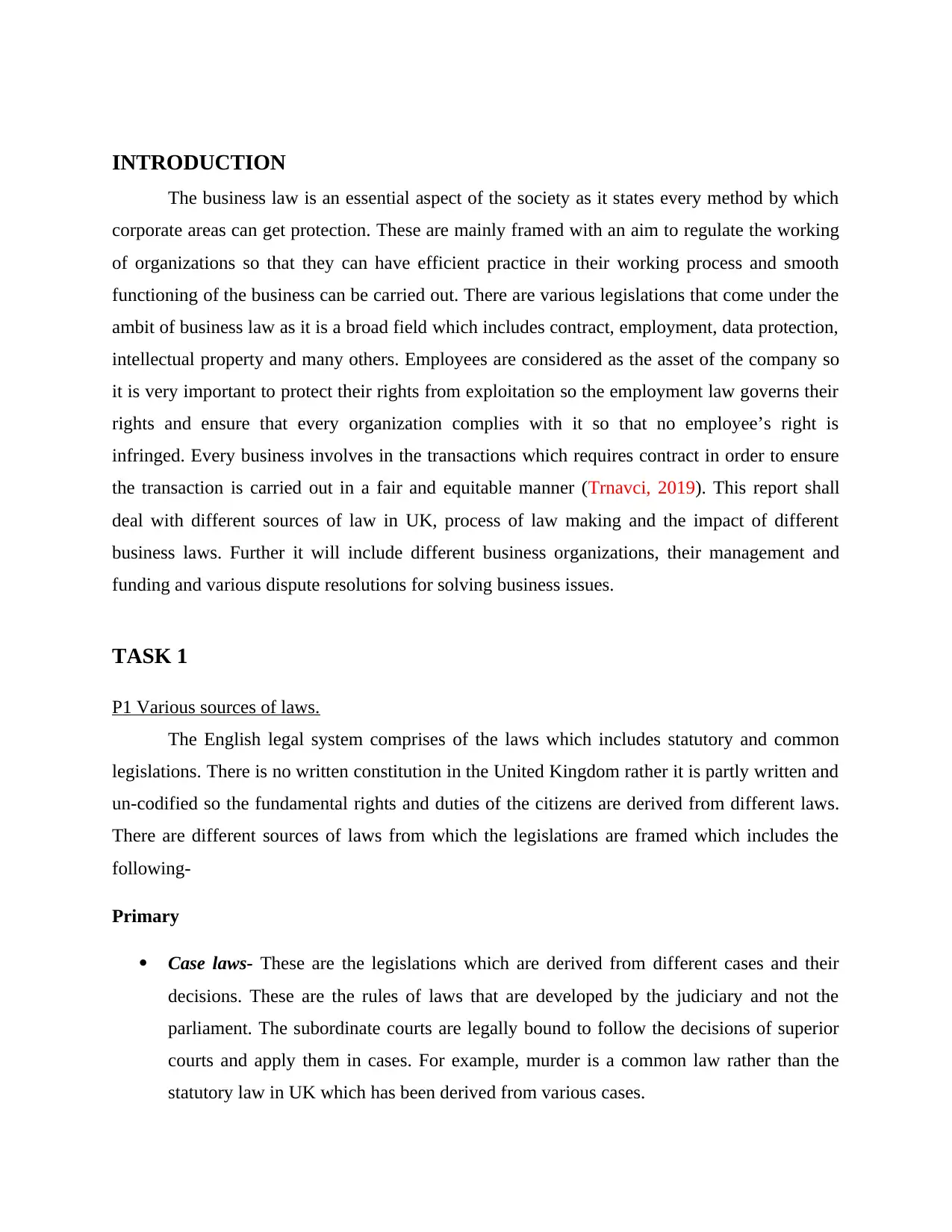
INTRODUCTION
The business law is an essential aspect of the society as it states every method by which
corporate areas can get protection. These are mainly framed with an aim to regulate the working
of organizations so that they can have efficient practice in their working process and smooth
functioning of the business can be carried out. There are various legislations that come under the
ambit of business law as it is a broad field which includes contract, employment, data protection,
intellectual property and many others. Employees are considered as the asset of the company so
it is very important to protect their rights from exploitation so the employment law governs their
rights and ensure that every organization complies with it so that no employee’s right is
infringed. Every business involves in the transactions which requires contract in order to ensure
the transaction is carried out in a fair and equitable manner (Trnavci, 2019). This report shall
deal with different sources of law in UK, process of law making and the impact of different
business laws. Further it will include different business organizations, their management and
funding and various dispute resolutions for solving business issues.
TASK 1
P1 Various sources of laws.
The English legal system comprises of the laws which includes statutory and common
legislations. There is no written constitution in the United Kingdom rather it is partly written and
un-codified so the fundamental rights and duties of the citizens are derived from different laws.
There are different sources of laws from which the legislations are framed which includes the
following-
Primary
Case laws- These are the legislations which are derived from different cases and their
decisions. These are the rules of laws that are developed by the judiciary and not the
parliament. The subordinate courts are legally bound to follow the decisions of superior
courts and apply them in cases. For example, murder is a common law rather than the
statutory law in UK which has been derived from various cases.
The business law is an essential aspect of the society as it states every method by which
corporate areas can get protection. These are mainly framed with an aim to regulate the working
of organizations so that they can have efficient practice in their working process and smooth
functioning of the business can be carried out. There are various legislations that come under the
ambit of business law as it is a broad field which includes contract, employment, data protection,
intellectual property and many others. Employees are considered as the asset of the company so
it is very important to protect their rights from exploitation so the employment law governs their
rights and ensure that every organization complies with it so that no employee’s right is
infringed. Every business involves in the transactions which requires contract in order to ensure
the transaction is carried out in a fair and equitable manner (Trnavci, 2019). This report shall
deal with different sources of law in UK, process of law making and the impact of different
business laws. Further it will include different business organizations, their management and
funding and various dispute resolutions for solving business issues.
TASK 1
P1 Various sources of laws.
The English legal system comprises of the laws which includes statutory and common
legislations. There is no written constitution in the United Kingdom rather it is partly written and
un-codified so the fundamental rights and duties of the citizens are derived from different laws.
There are different sources of laws from which the legislations are framed which includes the
following-
Primary
Case laws- These are the legislations which are derived from different cases and their
decisions. These are the rules of laws that are developed by the judiciary and not the
parliament. The subordinate courts are legally bound to follow the decisions of superior
courts and apply them in cases. For example, murder is a common law rather than the
statutory law in UK which has been derived from various cases.
⊘ This is a preview!⊘
Do you want full access?
Subscribe today to unlock all pages.

Trusted by 1+ million students worldwide
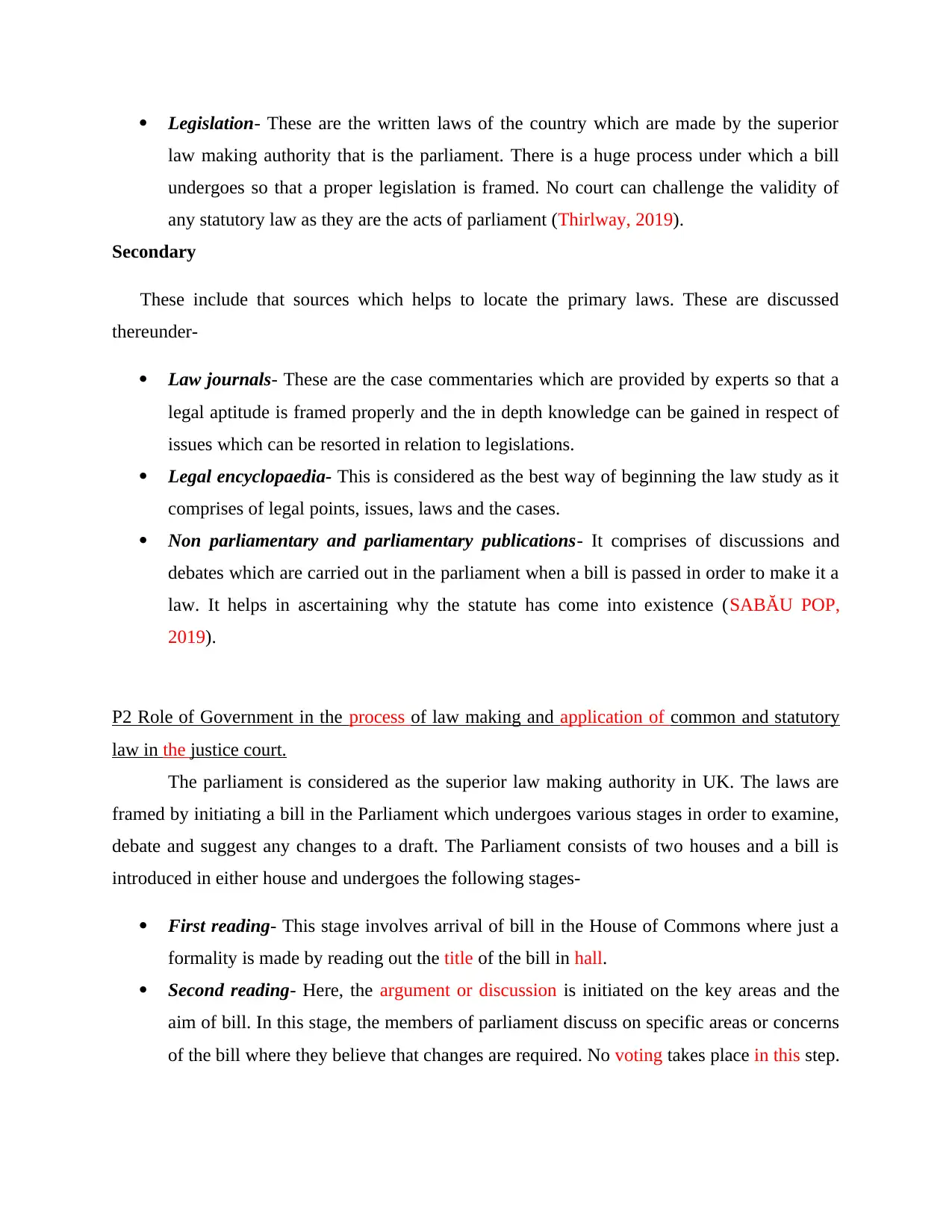
Legislation- These are the written laws of the country which are made by the superior
law making authority that is the parliament. There is a huge process under which a bill
undergoes so that a proper legislation is framed. No court can challenge the validity of
any statutory law as they are the acts of parliament (Thirlway, 2019).
Secondary
These include that sources which helps to locate the primary laws. These are discussed
thereunder-
Law journals- These are the case commentaries which are provided by experts so that a
legal aptitude is framed properly and the in depth knowledge can be gained in respect of
issues which can be resorted in relation to legislations.
Legal encyclopaedia- This is considered as the best way of beginning the law study as it
comprises of legal points, issues, laws and the cases.
Non parliamentary and parliamentary publications- It comprises of discussions and
debates which are carried out in the parliament when a bill is passed in order to make it a
law. It helps in ascertaining why the statute has come into existence (SABĂU POP,
2019).
P2 Role of Government in the process of law making and application of common and statutory
law in the justice court.
The parliament is considered as the superior law making authority in UK. The laws are
framed by initiating a bill in the Parliament which undergoes various stages in order to examine,
debate and suggest any changes to a draft. The Parliament consists of two houses and a bill is
introduced in either house and undergoes the following stages-
First reading- This stage involves arrival of bill in the House of Commons where just a
formality is made by reading out the title of the bill in hall.
Second reading- Here, the argument or discussion is initiated on the key areas and the
aim of bill. In this stage, the members of parliament discuss on specific areas or concerns
of the bill where they believe that changes are required. No voting takes place in this step.
law making authority that is the parliament. There is a huge process under which a bill
undergoes so that a proper legislation is framed. No court can challenge the validity of
any statutory law as they are the acts of parliament (Thirlway, 2019).
Secondary
These include that sources which helps to locate the primary laws. These are discussed
thereunder-
Law journals- These are the case commentaries which are provided by experts so that a
legal aptitude is framed properly and the in depth knowledge can be gained in respect of
issues which can be resorted in relation to legislations.
Legal encyclopaedia- This is considered as the best way of beginning the law study as it
comprises of legal points, issues, laws and the cases.
Non parliamentary and parliamentary publications- It comprises of discussions and
debates which are carried out in the parliament when a bill is passed in order to make it a
law. It helps in ascertaining why the statute has come into existence (SABĂU POP,
2019).
P2 Role of Government in the process of law making and application of common and statutory
law in the justice court.
The parliament is considered as the superior law making authority in UK. The laws are
framed by initiating a bill in the Parliament which undergoes various stages in order to examine,
debate and suggest any changes to a draft. The Parliament consists of two houses and a bill is
introduced in either house and undergoes the following stages-
First reading- This stage involves arrival of bill in the House of Commons where just a
formality is made by reading out the title of the bill in hall.
Second reading- Here, the argument or discussion is initiated on the key areas and the
aim of bill. In this stage, the members of parliament discuss on specific areas or concerns
of the bill where they believe that changes are required. No voting takes place in this step.
Paraphrase This Document
Need a fresh take? Get an instant paraphrase of this document with our AI Paraphraser
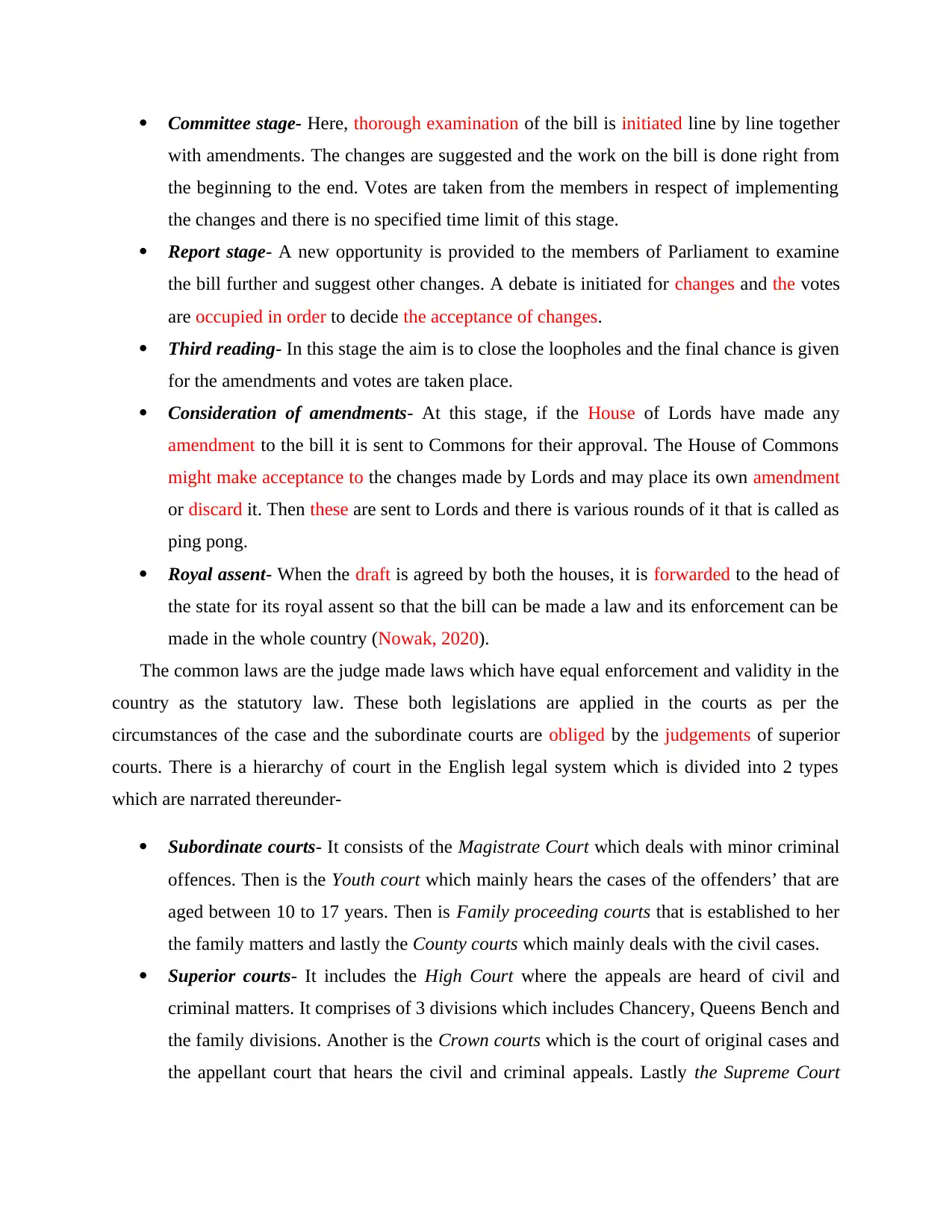
Committee stage- Here, thorough examination of the bill is initiated line by line together
with amendments. The changes are suggested and the work on the bill is done right from
the beginning to the end. Votes are taken from the members in respect of implementing
the changes and there is no specified time limit of this stage.
Report stage- A new opportunity is provided to the members of Parliament to examine
the bill further and suggest other changes. A debate is initiated for changes and the votes
are occupied in order to decide the acceptance of changes.
Third reading- In this stage the aim is to close the loopholes and the final chance is given
for the amendments and votes are taken place.
Consideration of amendments- At this stage, if the House of Lords have made any
amendment to the bill it is sent to Commons for their approval. The House of Commons
might make acceptance to the changes made by Lords and may place its own amendment
or discard it. Then these are sent to Lords and there is various rounds of it that is called as
ping pong.
Royal assent- When the draft is agreed by both the houses, it is forwarded to the head of
the state for its royal assent so that the bill can be made a law and its enforcement can be
made in the whole country (Nowak, 2020).
The common laws are the judge made laws which have equal enforcement and validity in the
country as the statutory law. These both legislations are applied in the courts as per the
circumstances of the case and the subordinate courts are obliged by the judgements of superior
courts. There is a hierarchy of court in the English legal system which is divided into 2 types
which are narrated thereunder-
Subordinate courts- It consists of the Magistrate Court which deals with minor criminal
offences. Then is the Youth court which mainly hears the cases of the offenders’ that are
aged between 10 to 17 years. Then is Family proceeding courts that is established to her
the family matters and lastly the County courts which mainly deals with the civil cases.
Superior courts- It includes the High Court where the appeals are heard of civil and
criminal matters. It comprises of 3 divisions which includes Chancery, Queens Bench and
the family divisions. Another is the Crown courts which is the court of original cases and
the appellant court that hears the civil and criminal appeals. Lastly the Supreme Court
with amendments. The changes are suggested and the work on the bill is done right from
the beginning to the end. Votes are taken from the members in respect of implementing
the changes and there is no specified time limit of this stage.
Report stage- A new opportunity is provided to the members of Parliament to examine
the bill further and suggest other changes. A debate is initiated for changes and the votes
are occupied in order to decide the acceptance of changes.
Third reading- In this stage the aim is to close the loopholes and the final chance is given
for the amendments and votes are taken place.
Consideration of amendments- At this stage, if the House of Lords have made any
amendment to the bill it is sent to Commons for their approval. The House of Commons
might make acceptance to the changes made by Lords and may place its own amendment
or discard it. Then these are sent to Lords and there is various rounds of it that is called as
ping pong.
Royal assent- When the draft is agreed by both the houses, it is forwarded to the head of
the state for its royal assent so that the bill can be made a law and its enforcement can be
made in the whole country (Nowak, 2020).
The common laws are the judge made laws which have equal enforcement and validity in the
country as the statutory law. These both legislations are applied in the courts as per the
circumstances of the case and the subordinate courts are obliged by the judgements of superior
courts. There is a hierarchy of court in the English legal system which is divided into 2 types
which are narrated thereunder-
Subordinate courts- It consists of the Magistrate Court which deals with minor criminal
offences. Then is the Youth court which mainly hears the cases of the offenders’ that are
aged between 10 to 17 years. Then is Family proceeding courts that is established to her
the family matters and lastly the County courts which mainly deals with the civil cases.
Superior courts- It includes the High Court where the appeals are heard of civil and
criminal matters. It comprises of 3 divisions which includes Chancery, Queens Bench and
the family divisions. Another is the Crown courts which is the court of original cases and
the appellant court that hears the civil and criminal appeals. Lastly the Supreme Court
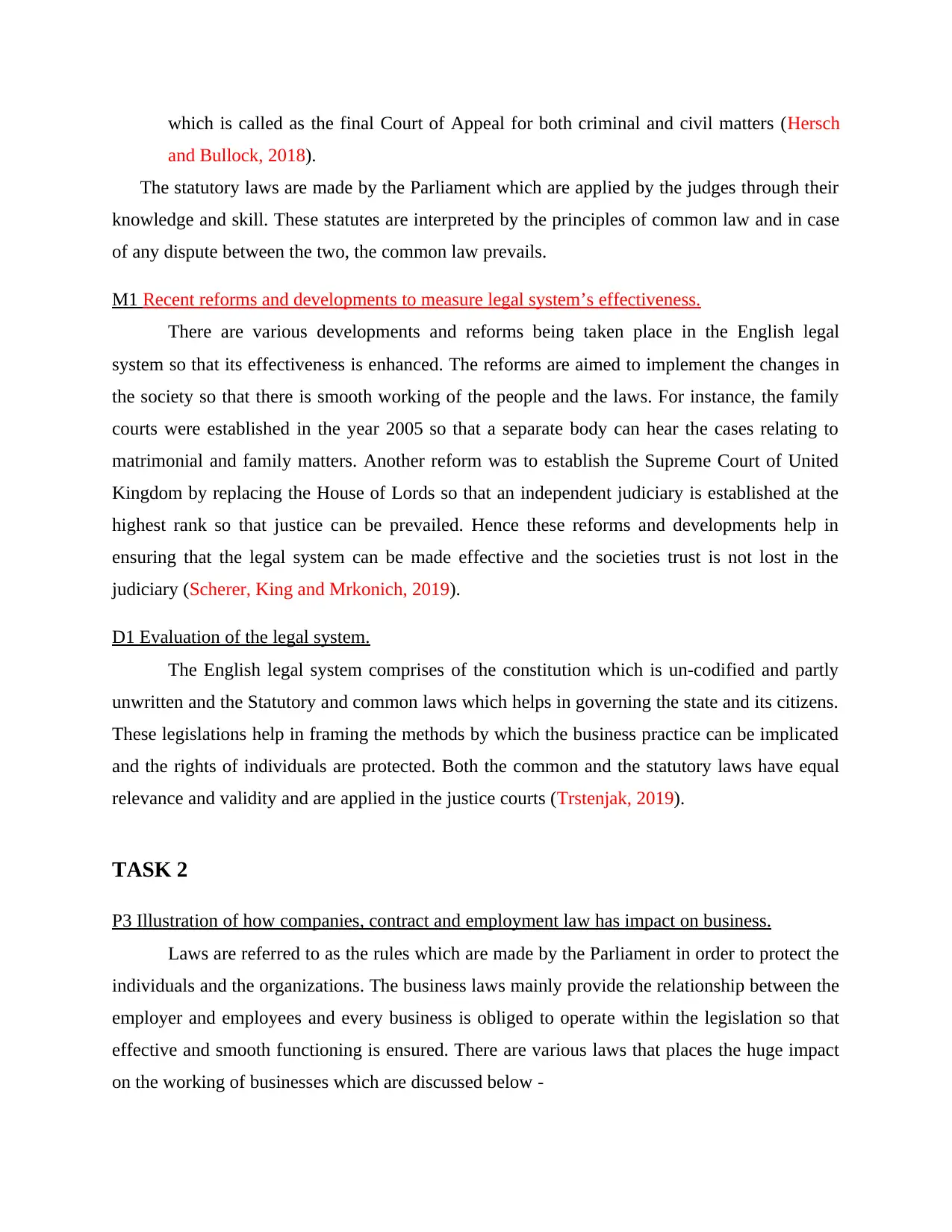
which is called as the final Court of Appeal for both criminal and civil matters (Hersch
and Bullock, 2018).
The statutory laws are made by the Parliament which are applied by the judges through their
knowledge and skill. These statutes are interpreted by the principles of common law and in case
of any dispute between the two, the common law prevails.
M1 Recent reforms and developments to measure legal system’s effectiveness.
There are various developments and reforms being taken place in the English legal
system so that its effectiveness is enhanced. The reforms are aimed to implement the changes in
the society so that there is smooth working of the people and the laws. For instance, the family
courts were established in the year 2005 so that a separate body can hear the cases relating to
matrimonial and family matters. Another reform was to establish the Supreme Court of United
Kingdom by replacing the House of Lords so that an independent judiciary is established at the
highest rank so that justice can be prevailed. Hence these reforms and developments help in
ensuring that the legal system can be made effective and the societies trust is not lost in the
judiciary (Scherer, King and Mrkonich, 2019).
D1 Evaluation of the legal system.
The English legal system comprises of the constitution which is un-codified and partly
unwritten and the Statutory and common laws which helps in governing the state and its citizens.
These legislations help in framing the methods by which the business practice can be implicated
and the rights of individuals are protected. Both the common and the statutory laws have equal
relevance and validity and are applied in the justice courts (Trstenjak, 2019).
TASK 2
P3 Illustration of how companies, contract and employment law has impact on business.
Laws are referred to as the rules which are made by the Parliament in order to protect the
individuals and the organizations. The business laws mainly provide the relationship between the
employer and employees and every business is obliged to operate within the legislation so that
effective and smooth functioning is ensured. There are various laws that places the huge impact
on the working of businesses which are discussed below -
and Bullock, 2018).
The statutory laws are made by the Parliament which are applied by the judges through their
knowledge and skill. These statutes are interpreted by the principles of common law and in case
of any dispute between the two, the common law prevails.
M1 Recent reforms and developments to measure legal system’s effectiveness.
There are various developments and reforms being taken place in the English legal
system so that its effectiveness is enhanced. The reforms are aimed to implement the changes in
the society so that there is smooth working of the people and the laws. For instance, the family
courts were established in the year 2005 so that a separate body can hear the cases relating to
matrimonial and family matters. Another reform was to establish the Supreme Court of United
Kingdom by replacing the House of Lords so that an independent judiciary is established at the
highest rank so that justice can be prevailed. Hence these reforms and developments help in
ensuring that the legal system can be made effective and the societies trust is not lost in the
judiciary (Scherer, King and Mrkonich, 2019).
D1 Evaluation of the legal system.
The English legal system comprises of the constitution which is un-codified and partly
unwritten and the Statutory and common laws which helps in governing the state and its citizens.
These legislations help in framing the methods by which the business practice can be implicated
and the rights of individuals are protected. Both the common and the statutory laws have equal
relevance and validity and are applied in the justice courts (Trstenjak, 2019).
TASK 2
P3 Illustration of how companies, contract and employment law has impact on business.
Laws are referred to as the rules which are made by the Parliament in order to protect the
individuals and the organizations. The business laws mainly provide the relationship between the
employer and employees and every business is obliged to operate within the legislation so that
effective and smooth functioning is ensured. There are various laws that places the huge impact
on the working of businesses which are discussed below -
⊘ This is a preview!⊘
Do you want full access?
Subscribe today to unlock all pages.

Trusted by 1+ million students worldwide
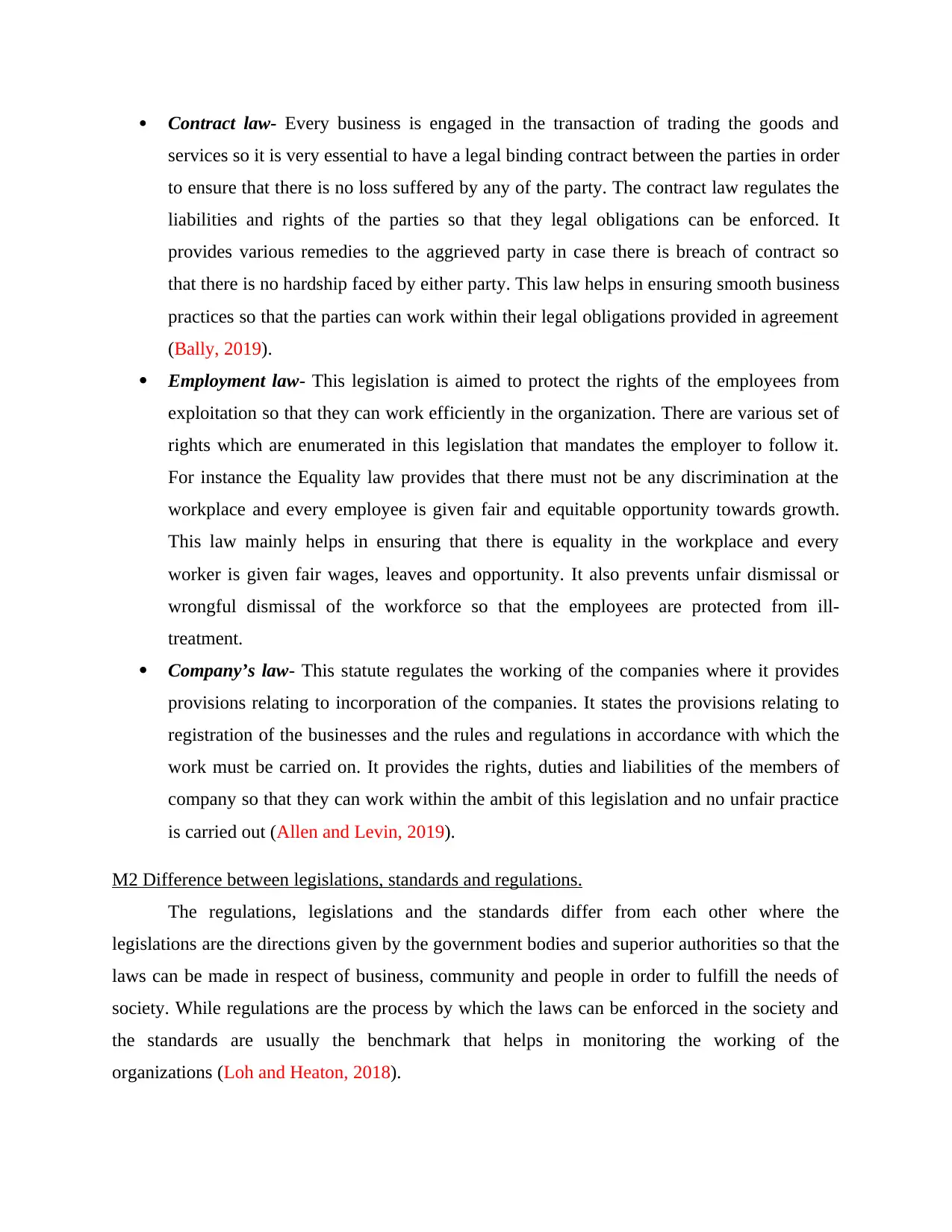
Contract law- Every business is engaged in the transaction of trading the goods and
services so it is very essential to have a legal binding contract between the parties in order
to ensure that there is no loss suffered by any of the party. The contract law regulates the
liabilities and rights of the parties so that they legal obligations can be enforced. It
provides various remedies to the aggrieved party in case there is breach of contract so
that there is no hardship faced by either party. This law helps in ensuring smooth business
practices so that the parties can work within their legal obligations provided in agreement
(Bally, 2019).
Employment law- This legislation is aimed to protect the rights of the employees from
exploitation so that they can work efficiently in the organization. There are various set of
rights which are enumerated in this legislation that mandates the employer to follow it.
For instance the Equality law provides that there must not be any discrimination at the
workplace and every employee is given fair and equitable opportunity towards growth.
This law mainly helps in ensuring that there is equality in the workplace and every
worker is given fair wages, leaves and opportunity. It also prevents unfair dismissal or
wrongful dismissal of the workforce so that the employees are protected from ill-
treatment.
Company’s law- This statute regulates the working of the companies where it provides
provisions relating to incorporation of the companies. It states the provisions relating to
registration of the businesses and the rules and regulations in accordance with which the
work must be carried on. It provides the rights, duties and liabilities of the members of
company so that they can work within the ambit of this legislation and no unfair practice
is carried out (Allen and Levin, 2019).
M2 Difference between legislations, standards and regulations.
The regulations, legislations and the standards differ from each other where the
legislations are the directions given by the government bodies and superior authorities so that the
laws can be made in respect of business, community and people in order to fulfill the needs of
society. While regulations are the process by which the laws can be enforced in the society and
the standards are usually the benchmark that helps in monitoring the working of the
organizations (Loh and Heaton, 2018).
services so it is very essential to have a legal binding contract between the parties in order
to ensure that there is no loss suffered by any of the party. The contract law regulates the
liabilities and rights of the parties so that they legal obligations can be enforced. It
provides various remedies to the aggrieved party in case there is breach of contract so
that there is no hardship faced by either party. This law helps in ensuring smooth business
practices so that the parties can work within their legal obligations provided in agreement
(Bally, 2019).
Employment law- This legislation is aimed to protect the rights of the employees from
exploitation so that they can work efficiently in the organization. There are various set of
rights which are enumerated in this legislation that mandates the employer to follow it.
For instance the Equality law provides that there must not be any discrimination at the
workplace and every employee is given fair and equitable opportunity towards growth.
This law mainly helps in ensuring that there is equality in the workplace and every
worker is given fair wages, leaves and opportunity. It also prevents unfair dismissal or
wrongful dismissal of the workforce so that the employees are protected from ill-
treatment.
Company’s law- This statute regulates the working of the companies where it provides
provisions relating to incorporation of the companies. It states the provisions relating to
registration of the businesses and the rules and regulations in accordance with which the
work must be carried on. It provides the rights, duties and liabilities of the members of
company so that they can work within the ambit of this legislation and no unfair practice
is carried out (Allen and Levin, 2019).
M2 Difference between legislations, standards and regulations.
The regulations, legislations and the standards differ from each other where the
legislations are the directions given by the government bodies and superior authorities so that the
laws can be made in respect of business, community and people in order to fulfill the needs of
society. While regulations are the process by which the laws can be enforced in the society and
the standards are usually the benchmark that helps in monitoring the working of the
organizations (Loh and Heaton, 2018).
Paraphrase This Document
Need a fresh take? Get an instant paraphrase of this document with our AI Paraphraser

TASK 3&4
Covered in PPT
Covered in PPT
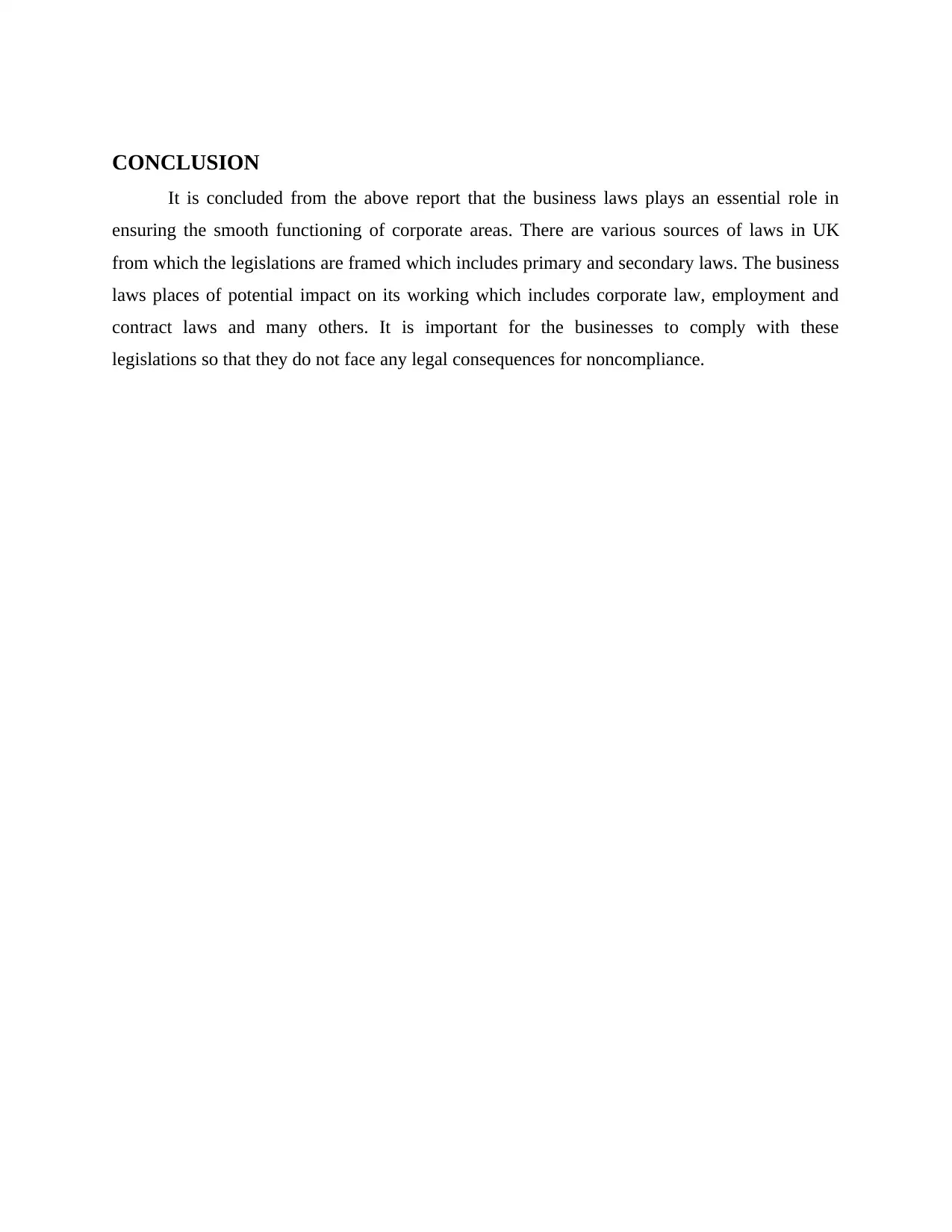
CONCLUSION
It is concluded from the above report that the business laws plays an essential role in
ensuring the smooth functioning of corporate areas. There are various sources of laws in UK
from which the legislations are framed which includes primary and secondary laws. The business
laws places of potential impact on its working which includes corporate law, employment and
contract laws and many others. It is important for the businesses to comply with these
legislations so that they do not face any legal consequences for noncompliance.
It is concluded from the above report that the business laws plays an essential role in
ensuring the smooth functioning of corporate areas. There are various sources of laws in UK
from which the legislations are framed which includes primary and secondary laws. The business
laws places of potential impact on its working which includes corporate law, employment and
contract laws and many others. It is important for the businesses to comply with these
legislations so that they do not face any legal consequences for noncompliance.
⊘ This is a preview!⊘
Do you want full access?
Subscribe today to unlock all pages.

Trusted by 1+ million students worldwide
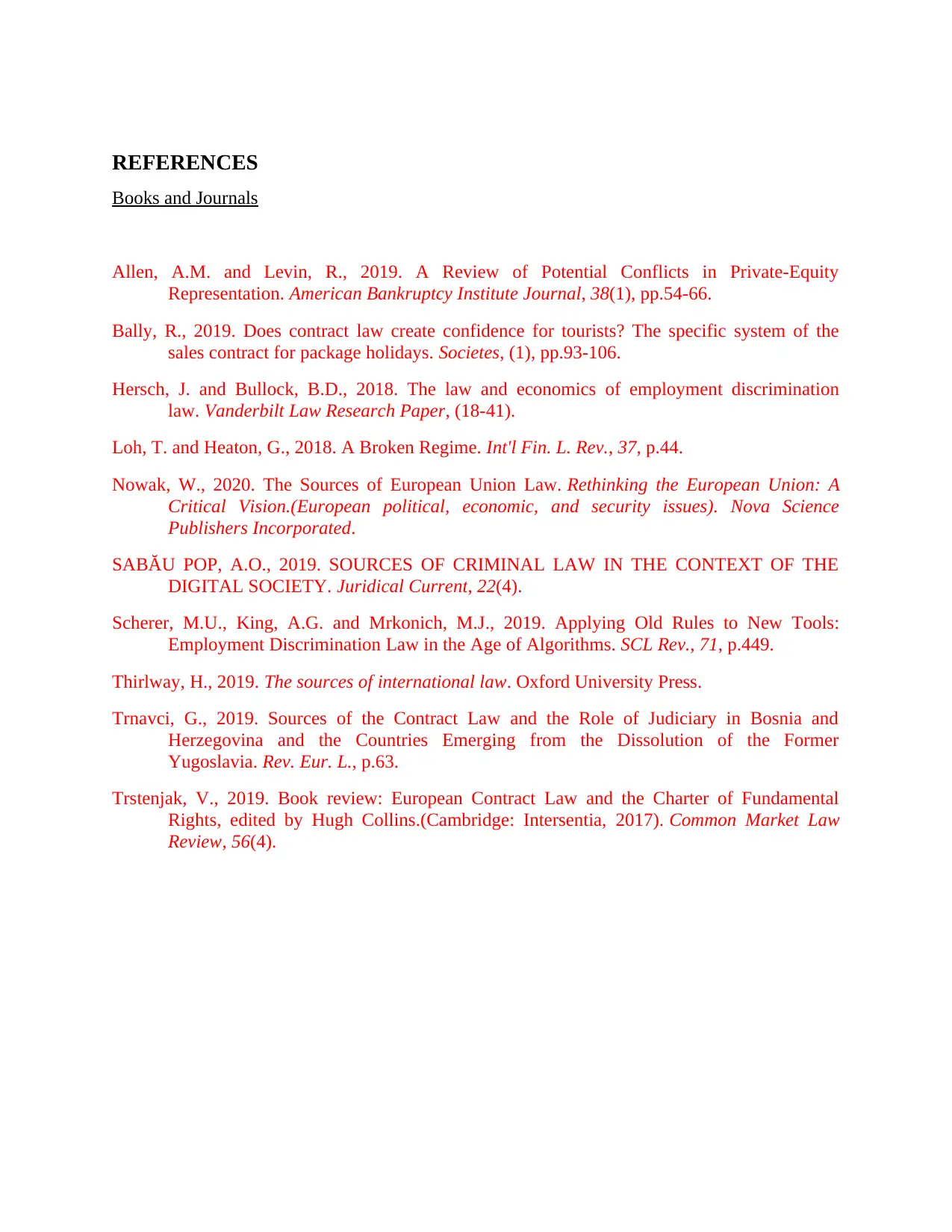
REFERENCES
Books and Journals
Allen, A.M. and Levin, R., 2019. A Review of Potential Conflicts in Private-Equity
Representation. American Bankruptcy Institute Journal, 38(1), pp.54-66.
Bally, R., 2019. Does contract law create confidence for tourists? The specific system of the
sales contract for package holidays. Societes, (1), pp.93-106.
Hersch, J. and Bullock, B.D., 2018. The law and economics of employment discrimination
law. Vanderbilt Law Research Paper, (18-41).
Loh, T. and Heaton, G., 2018. A Broken Regime. Int'l Fin. L. Rev., 37, p.44.
Nowak, W., 2020. The Sources of European Union Law. Rethinking the European Union: A
Critical Vision.(European political, economic, and security issues). Nova Science
Publishers Incorporated.
SABĂU POP, A.O., 2019. SOURCES OF CRIMINAL LAW IN THE CONTEXT OF THE
DIGITAL SOCIETY. Juridical Current, 22(4).
Scherer, M.U., King, A.G. and Mrkonich, M.J., 2019. Applying Old Rules to New Tools:
Employment Discrimination Law in the Age of Algorithms. SCL Rev., 71, p.449.
Thirlway, H., 2019. The sources of international law. Oxford University Press.
Trnavci, G., 2019. Sources of the Contract Law and the Role of Judiciary in Bosnia and
Herzegovina and the Countries Emerging from the Dissolution of the Former
Yugoslavia. Rev. Eur. L., p.63.
Trstenjak, V., 2019. Book review: European Contract Law and the Charter of Fundamental
Rights, edited by Hugh Collins.(Cambridge: Intersentia, 2017). Common Market Law
Review, 56(4).
Books and Journals
Allen, A.M. and Levin, R., 2019. A Review of Potential Conflicts in Private-Equity
Representation. American Bankruptcy Institute Journal, 38(1), pp.54-66.
Bally, R., 2019. Does contract law create confidence for tourists? The specific system of the
sales contract for package holidays. Societes, (1), pp.93-106.
Hersch, J. and Bullock, B.D., 2018. The law and economics of employment discrimination
law. Vanderbilt Law Research Paper, (18-41).
Loh, T. and Heaton, G., 2018. A Broken Regime. Int'l Fin. L. Rev., 37, p.44.
Nowak, W., 2020. The Sources of European Union Law. Rethinking the European Union: A
Critical Vision.(European political, economic, and security issues). Nova Science
Publishers Incorporated.
SABĂU POP, A.O., 2019. SOURCES OF CRIMINAL LAW IN THE CONTEXT OF THE
DIGITAL SOCIETY. Juridical Current, 22(4).
Scherer, M.U., King, A.G. and Mrkonich, M.J., 2019. Applying Old Rules to New Tools:
Employment Discrimination Law in the Age of Algorithms. SCL Rev., 71, p.449.
Thirlway, H., 2019. The sources of international law. Oxford University Press.
Trnavci, G., 2019. Sources of the Contract Law and the Role of Judiciary in Bosnia and
Herzegovina and the Countries Emerging from the Dissolution of the Former
Yugoslavia. Rev. Eur. L., p.63.
Trstenjak, V., 2019. Book review: European Contract Law and the Charter of Fundamental
Rights, edited by Hugh Collins.(Cambridge: Intersentia, 2017). Common Market Law
Review, 56(4).
1 out of 10
Related Documents
Your All-in-One AI-Powered Toolkit for Academic Success.
+13062052269
info@desklib.com
Available 24*7 on WhatsApp / Email
![[object Object]](/_next/static/media/star-bottom.7253800d.svg)
Unlock your academic potential
Copyright © 2020–2025 A2Z Services. All Rights Reserved. Developed and managed by ZUCOL.





